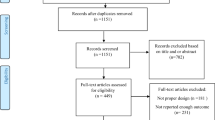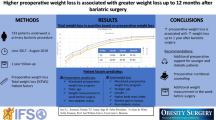Abstract
Introduction
The effect of preoperative weight loss via very low caloric diet (VLCD) on long-term weight loss post-bariatric surgery (BS) is conflicting. We analysed its impact on weight loss and other outcomes post-BS.
Methods
Patients (n = 306) who underwent sleeve gastrectomy or gastric bypass from 2008 to 2018 were studied. VLCD was prescribed for 14 days preoperatively. Patients were followed up for 5 years. Postoperative weight loss was compared in patients with preoperative weight gain or weight loss < 5% (WL < 5%), and weight loss ≥ 5% (WL ≥ 5%). Preoperative WL compared weight before and after VLCD; postoperative WL compared post-VLCD weight and follow-up weight. Total weight loss (TWL) encompassed pre- and postoperative WL.
Results
WL was < 5% in 87.3% and ≥ 5% in 12.7%. There was no significant difference in complication rate, duration of surgery or length of stay, regardless of surgical type. Patients with WL < 5% lost more weight postoperatively compared with WL ≥ 5% for up to 60 months (%postoperative WL at 1 month: WL < 5% = 13.7%, WL ≥ 5% = 10%, p = <0.001; 60 months: WL < 5% = 30.6%, WL ≥ 5% = 23.9%, p = 0.041). However, when TWL and percentage of excess body mass index loss (%EBMIL) were measured, there was no difference beyond 6 months. A predictive multivariable model for 1-year %EBMIL was formed. Significant variables included pre-VLCD BMI and preoperative WL, and the relationship between the two.
Conclusion
Preoperative WL via VLCD was associated with reduced postoperative WL after BS, with no significant effect on complications, long-term TWL or %EBMIL. This challenges the notion that preoperative WL via VLCD should be mandated for better postoperative outcomes.




Similar content being viewed by others
References
Sjöström L, Peltonen M, Jacobson P, et al. Bariatric surgery and long-term cardiovascular events. JAMA. 2012;307:56.
Schauer PR, Bhatt DL, Kirwan JP, et al. Bariatric surgery versus intensive medical therapy for diabetes — 5-year outcomes. N Engl J Med. 2017;376:641–51.
González-Pérez J, Sánchez-Leenheer S, Delgado AR, et al. Clinical impact of a 6-week preoperative very low calorie diet on body weight and liver size in morbidly obese patients. Obes Surg. 2013;23:1624–31.
Colles SL, Dixon JB, Marks P, et al. Preoperative weight loss with a very-low-energy diet: quantitation of changes in liver and abdominal fat by serial imaging. Am J Clin Nutr. 2006;84:304–11.
Fris RJ. Preoperative low energy diet diminishes liver size. Obes Surg. 2004;14:1165–70.
Livhits M, Mercado C, Yermilov I, et al. Preoperative predictors of weight loss following bariatric surgery: systematic review. Obes Surg. 2012;22:70–89.
Gerber P, Anderin C, Thorell A. Weight loss prior to bariatric surgery: an updated review of the literature. Scand J Surg. 2015;104:33–9.
Safadi BY. Trends in insurance coverage for bariatric surgery and the impact of evidence-based reviews. Surg Clin North Am. 2005;85:665–80.
Van Nieuwenhove Y. Preoperative very low-calorie diet and operative outcome after laparoscopic gastric bypass: a randomized multicenter study. Arch Surg. 2011;146:1300.
Alvarado R, Alami RS, Hsu G, et al. The impact of preoperative weight loss in patients undergoing laparoscopic Roux-en-Y gastric bypass. Obes Surg. 2005;15:1282–6.
Harnisch MC, Portenier DD, Pryor AD, et al. Preoperative weight gain does not predict failure of weight loss or co-morbidity resolution of laparoscopic Roux-en-Y gastric bypass for morbid obesity. Surg Obes Relat Dis. 2008;4:445–50.
Alami RS, Morton JM, Schuster R, et al. Is there a benefit to preoperative weight loss in gastric bypass patients? A prospective randomized trial. Surg Obes Relat Dis. 2007;3:141–5.
Lim CH, Lee PC, Lim E, et al. Correlation between symptomatic gastro-esophageal reflux disease (GERD) and erosive esophagitis (EE) post-vertical sleeve gastrectomy (VSG). Obes Surg. 2019;29:207–14.
Lim CH, Jahansouz C, Abraham AA, et al. The future of the Roux-en-Y gastric bypass. Expert Rev Gastroenterol Hepatol. 2016;10:777–84.
Appropriate body-mass index for Asian populations and its implications for policy and intervention strategies. Lancet. 2004;363:157–63.
Brethauer SA, Kim J, el Chaar M, et al. Standardized outcomes reporting in metabolic and bariatric surgery. Surg Obes Relat Dis. 2015;11:489–506.
Ochner CN, Gibson C, Shanik M, et al. Changes in neurohormonal gut peptides following bariatric surgery. Int J Obes. 2011;35:153–66.
Miras AD, le Roux CW. Mechanisms underlying weight loss after bariatric surgery. Nat Rev Gastroenterol Hepatol. 2013;10:575–84.
Ochner CN, Puma LM, Raevuori A, et al. Effectiveness of a prebariatric surgery insurance-required weight loss regimen and relation to postsurgical weight loss. Obesity. 2010;18:287–92.
Bocchieri-Ricciardi L, Chen E, Munoz D, et al. Pre-surgery binge eating status: effect on eating behavior and weight outcome after gastric bypass. Obes Surg. 2006;16:1198–204.
Wood GC, Benotti P, Gerhard GS, et al. A patient-centered electronic tool for weight loss outcomes after Roux-en-Y gastric bypass. J Obes. 2014;2014:1–7.
Goulart A, Leão P, Costa P, et al. Doctor, how much weight will I lose?—a new individualized predictive model for weight loss. Obes Surg. 2016;26:1357–9.
Sharples AJ, Mahawar K, Cheruvu CVN. Systematic review and retrospective validation of prediction models for weight loss after bariatric surgery. Surg Obes Relat Dis. 2017;13:1914–20.
Author information
Authors and Affiliations
Corresponding author
Ethics declarations
Conflict of Interest
The authors declare that they have no conflict of interest.
Statement of Human Rights
This study has been approved by the institutional review board (IRB).
Additional information
Publisher’s Note
Springer Nature remains neutral with regard to jurisdictional claims in published maps and institutional affiliations.
Rights and permissions
About this article
Cite this article
Tan, S.Y.T., Loi, P.L., Lim, C.H. et al. Preoperative Weight Loss via Very Low Caloric Diet (VLCD) and Its Effect on Outcomes After Bariatric Surgery. OBES SURG 30, 2099–2107 (2020). https://doi.org/10.1007/s11695-020-04446-y
Published:
Issue Date:
DOI: https://doi.org/10.1007/s11695-020-04446-y




